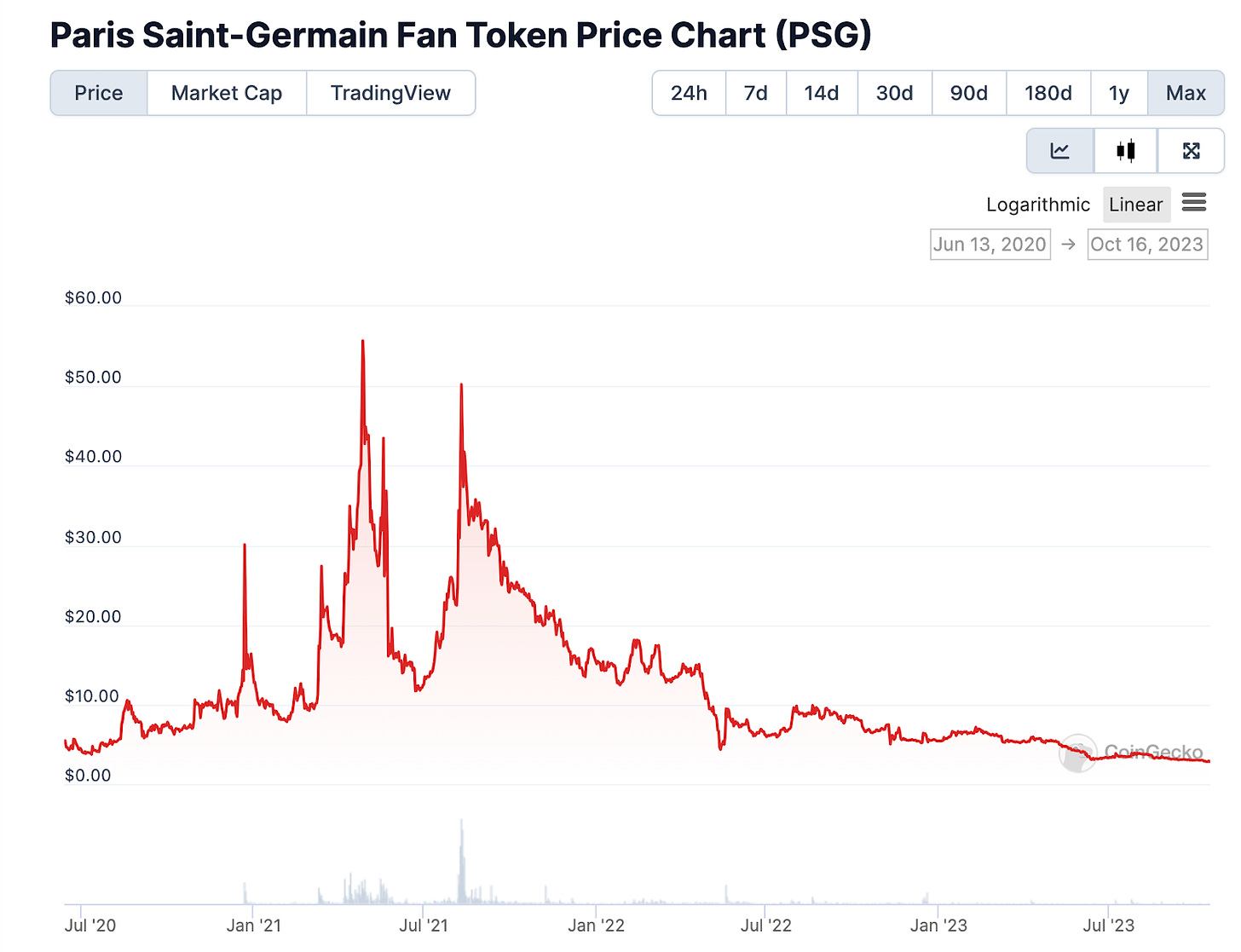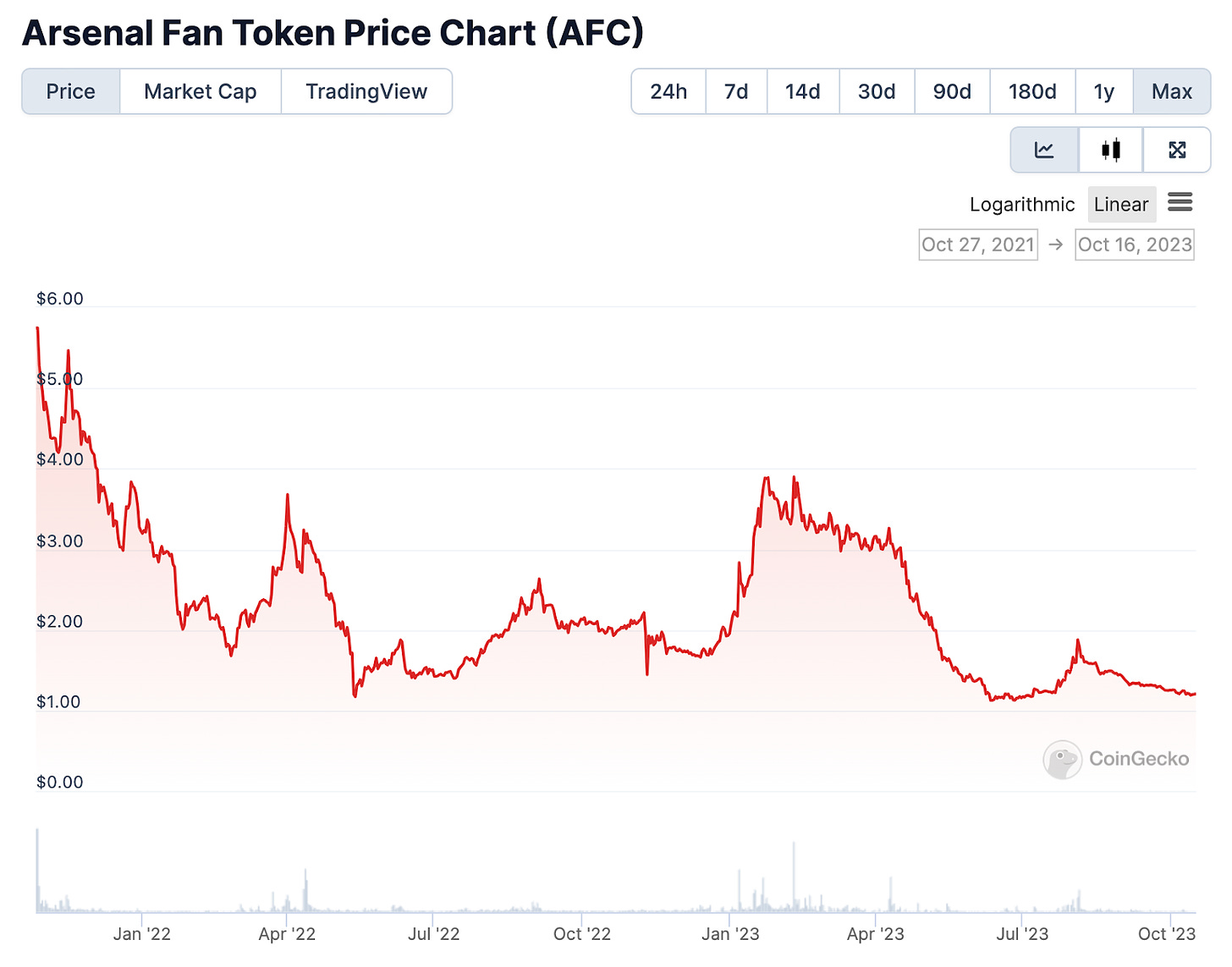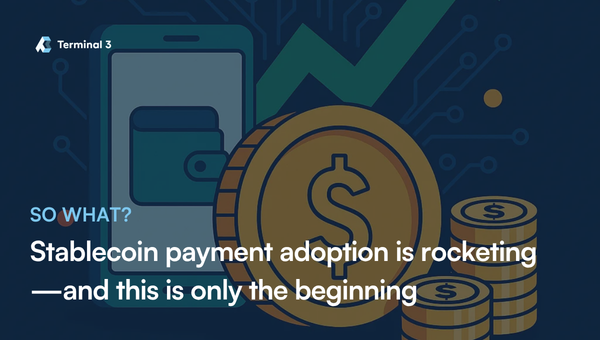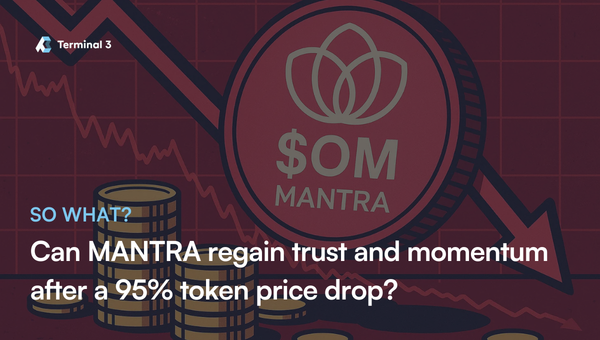Fan Tokens come under fire as supporters continue to lose money

GM,
This week we’re looking at sport and Web3 and a polarizing debate around fan engagement.
Soccer team Tottenham Hotspur sits top of the English Premier League after its best start to a season since 1980. But despite the feel-good factor around the team, there’s concern after Tottenham launched a fan token in early October.
Fan tokens are a topic we’ve been following closely for simple reasons: fans almost always lose money, with little in the way of upside. Now, fan tokens have been highlighted by the British government, which has been deeply critical of the concept in a report published earlier this month.
This is a topic ripe for SO WHAT.
Best,
What’s going on?
A UK Parliamentary report published last week warned that fan tokens—cryptocurrencies tied to clubs that are sold to fans—carry “a real risk of financial harm to fans and reputational harm to clubs.” The report was timely since London-based Tottenham Hotspur F.C. became the latest English Premiership soccer team to issue a fan token.
The #SPURS token, like dozens that have launched before it over the last two years, is billed as giving fans an opportunity “to engage [with the club] and earn exclusive rewards.” In return, the club stands to raise at least $74 million over the next 10 years.
There’s a problem, however, the report found they didn't deliver on the core promise of engagement—and there’s plenty of evidence to support that.
SO WHAT?
1. A community of billions
The fan token concept is based on logic. Sports fandom is a powerful community—soccer alone is believed to have over 3 billion fans worldwide, while baseball, basketball and American football combined reach nearly 1.5 billion. As we previously wrote, strong community is a core requisite for Web3 projects.
Fans buy a club token which grants access to activities such as club polls, picking squad numbers for new signings, voting in monthly awards, behind the scenes content, cashback opportunities and giveaways.
Socios.com—the company working with Tottenham and other clubs on fan tokens—explains that, in terms of soccer at least, fan tokens help clubs engage with global supporter bases which now account for half of their TV revenue. “Fan Tokens are designed to add fun and rewarding opportunities for global fans, not to replace supporter governance,” it states.
That’s a warm narrative but sport is a mega business and tokens enable clubs to generate additional revenue.
In the case of Tottenham, the club is issuing an initial 500,000 #SPURS tokens at $2 each through staggered sales. It plans to offer a total of 37 million tokens over the next ten years. That would net the club $74 million, but it stands to make further income by taking a cut of token sales from the secondary market.
That sounds impressive but it’s a drop in the bucket. Tottenham didn’t have the greatest time last season, failing to qualify for the lucrative Champions League competition. But the club still secured an estimated £134 million ($163 million) in prize money, plus it has revenue from sponsorships, stadiums and more.
2. Fans lose money
Money is where things come unstuck. For a relative meager payout, clubs put their fans—the lifeblood of their business—in a position to lose money. Protecting consumers is the chief concern of the British government report.
Socios claims fan tokens have utility, but that’s a tough augment to make. Aside from light engagement and giveaways—Socios claims to have given out over 24,000 match tickets and more than 1,000 items of merchandise and memorabilia—there’s very little of note. Socios openly admits fan tokens don’t have bearing on how a club is run.
When there’s no utility or genuine base to a Web3 offering, sentiment takes over and that’s undeniably the case for fan tokens.
The charts speak for themselves. Below, you can see the spikes when Paris Saint-Germain was first linked with signing Lionel Messi—arguably the world’s greatest player—and then secured his transfer in August 2021. Fans who bought into the hype are down hugely.

Another example is Arsenal—Tottenham’s arch rival—which saw its fan token price crater this year as the then-top of the table team lost the Premier League top spot and finished runner-up

3. There’s much more to Web3 and sports
Socios could take inspiration from a 100-year-old scheme in the US. American football franchise Green Bay Packers has been owned since 1923 when it became a publicly-owned, non-profit corporation.
It has held six limited stock sales with the most recent in 2021 netting over $65 million through 176,160 new shareholders. Shareholders receive no dividend and shares can’t be resold but they do enable voting rights, chiefly to elect the seven-person board. Essentially, as the Packers put it, the club is “kept viable by its shareholders — its unselfish fans.”
Fan tokens are what happens when you enable trading, but Web3 still has vast potential in sports. Clubs have experimented with NFT ticketing that not only removes touts and scalping but enables fan engagement by offering benefits (similar to those offered by fan tokens) tied to tickets.
NFT-based fantasy games have also taken off using blockchain technology to track and payout with greater efficiency. Over the summer, fantasy sports accounted for one-quarter of NFT transactions. Soccer-focused Sorare was valued at over $4 billion by investors and US-focused DraftKings is a public company with a market capitalization of nearly $14 billion.
We’ve even seen efforts at tokenizing player contracts. Brooklyn Nets basketball player Spencer Dinwiddie opened his $34 million playing contract by effectively creating a bond sale to access the capital up front. The sale itself, which happened right before the Covid pandemic in 2020, was a flop, selling just 10% of the $13.5 million target but it laid the foundations that others might build on.
The UK government looks set to go on the offensive to protect supporters from fan tokens—that’s a development to keep an eye on—but that doesn’t mean Web3’s doors are closed to sport. Far from it.
News bytes
Bitcoin jumped 10% after crypto media outlet CoinTelegraph tweeted that BlockRock had won regulator approval for a Bitcoin ETF—the gains were eroded after BlackRock denied the claim within an hour but the price movement still liquidated some $100 million in Bitcoin positions
Reddit is closing its blockchain-based reward service after struggling to scale the three-year-old initiative amid regulatory concerns—this despite its success selling NFTs
Binance has stopped accepting UK customers until it finds a new partner that’s compliant with new regulations—existing customers will also not get access to any new products launched
Ferrari now accepts payment in cryptocurrency for its luxury sports cars in the US apparently after conceding to demand from customers
The US government has $5 billion in Bitcoin—making it one of the largest BTC holders, all thanks to confiscated assets taken from cyber criminals or dark net assets (here’s an incredible story of how US investigators nabbed one crypto thief)
That’s all for this week!
Share your feedback, questions or requests via email to: sowhat@terminal3.io




